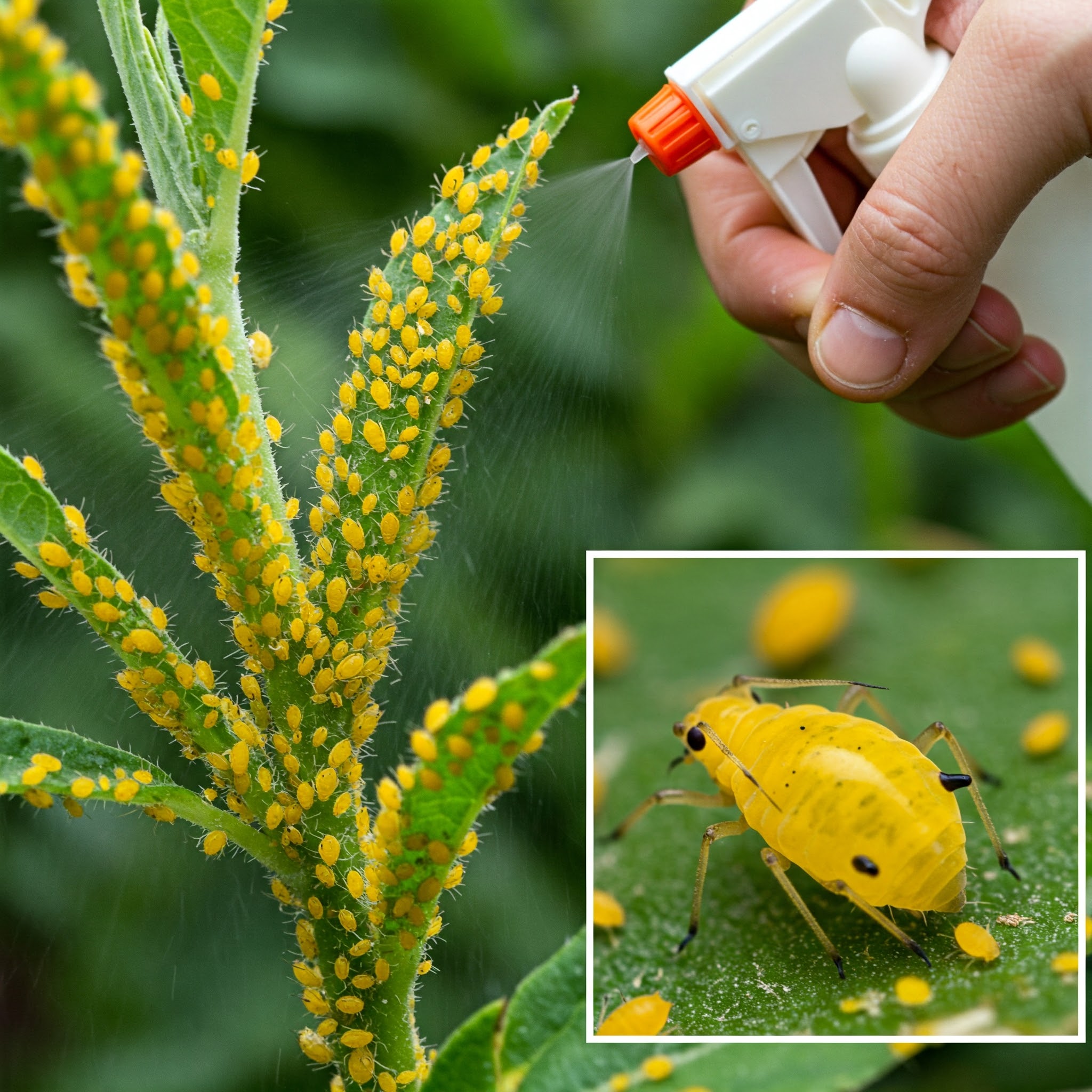ADVERTISEMENT
# **No More Aphids: The Best Natural Remedy Against Plant Lice Made in 5 Minutes**
Aphids, or plant lice, are among the most common pests that plague gardens and indoor plants. These tiny insects are known for their destructive feeding habits, which can cause wilting, yellowing of leaves, and even stunted growth. Aphids tend to congregate in large numbers, sucking the sap from plants, and can quickly spread from one plant to another, resulting in a major infestation if left untreated. While there are various chemical solutions available to control aphid populations, many gardeners prefer natural remedies, especially those who are interested in maintaining an eco-friendly and non-toxic garden.
In this article, we’ll delve into the best natural remedy to get rid of aphids in just 5 minutes. We will explore what aphids are, why they are problematic, and how you can effectively use natural solutions to combat them. From homemade sprays to beneficial insects, you’ll learn everything you need to know to tackle an aphid problem using methods that are both fast and environmentally friendly.
—
## **1. Understanding Aphids: The Culprit Behind Plant Damage**
Aphids, scientifically known as *Aphidoidea*, are small, soft-bodied insects that feed on the sap of plants. They are typically no more than a few millimeters in length and come in a variety of colors, including green, black, white, yellow, and even red. Despite their small size, aphids can cause a significant amount of damage to plants if not controlled.
### **The Feeding Habits of Aphids**
Aphids have specialized mouthparts called **stylets**, which they use to pierce the plant’s cell walls and feed on the sap inside. As aphids feed, they excrete a sugary substance known as **honeydew**, which can attract other pests like ants and fungal diseases. Honeydew accumulation on plant leaves can also cause the growth of **sooty mold**, which blocks sunlight and further weakens the plant.
### **How Aphids Damage Plants**
The damage caused by aphids goes beyond their direct feeding. In addition to weakening plants by sucking out vital nutrients, aphids can also:
– **Distort leaves and stems**: As aphids feed, they cause plants to form abnormal growths, such as curled or misshapen leaves.
– **Transmit diseases**: Aphids can carry and transmit various plant viruses and pathogens from one plant to another, exacerbating the damage they cause.
– **Stunt plant growth**: Prolonged aphid infestations can lead to stunted plant growth, especially in young plants or seedlings, as they rely on a steady flow of nutrients from the soil.
– **Encourage secondary pests**: The honeydew excreted by aphids serves as a food source for other pests, including ants, which can protect aphids from predators and further spread the infestation.
—
## **2. Why Choose Natural Remedies for Aphids?**
While chemical insecticides may offer a quick fix, they can have unintended consequences, both for the environment and your health. Here are several reasons why opting for natural remedies to control aphids is the best choice:
### **1. Environmentally Friendly**
Chemical pesticides can harm beneficial insects in your garden, such as bees, butterflies, and ladybugs, which play essential roles in pollination and pest control. Natural remedies, on the other hand, are generally safe for beneficial creatures and minimize the risk of collateral damage to your garden ecosystem.
### **2. Non-Toxic to Humans and Pets**
Many chemical pesticides contain harmful toxins that can be dangerous to children, pets, and even adults. Natural remedies, on the other hand, are usually made from household ingredients or plants, making them safe for humans and pets when used correctly.
### **3. Cost-Effective**
Natural remedies are often inexpensive and easy to make at home using common ingredients, saving you money on expensive commercial pesticides. Additionally, many natural solutions can be made in bulk, allowing you to treat multiple plants at once.
### **4. Sustainable and Long-Term Solution**
Natural remedies for aphids tend to be sustainable and provide long-term results without harming the environment. By encouraging beneficial insects, such as ladybugs and lacewings, you can create a balanced ecosystem that keeps aphids and other pests in check over time.
—
## **3. The Best Natural Remedies for Aphids: Quick, Effective Solutions**
Now that you understand the impact of aphids and why natural remedies are the way to go, let’s take a look at the top natural solutions that can effectively rid your garden of these pesky pests in just 5 minutes.
### **1. Homemade Soap Spray**
One of the most effective and simplest natural remedies for aphids is **homemade soap spray**. Soap sprays work by suffocating the aphids and breaking down their waxy protective coating, causing them to dry out and die. Here’s how you can make your own:
#### Ingredients:
– 1 tablespoon of **liquid dish soap** (preferably biodegradable and mild)
– 1 quart of **water**
#### Instructions:
1. Mix the liquid dish soap and water in a spray bottle.
2. Shake the bottle gently to combine the ingredients.
3. Spray the solution directly onto the aphids, ensuring that you cover the tops and undersides of the affected leaves and stems.
4. Repeat the treatment every 2-3 days until the aphids are gone.
**Tip**: Always test the soap solution on a small area of the plant before applying it more broadly to ensure that the plant is not sensitive to the soap.
For Complete Cooking STEPS Please Head On Over To Next Page Or Open button (>) and don’t forget to SHARE with your Facebook friends
